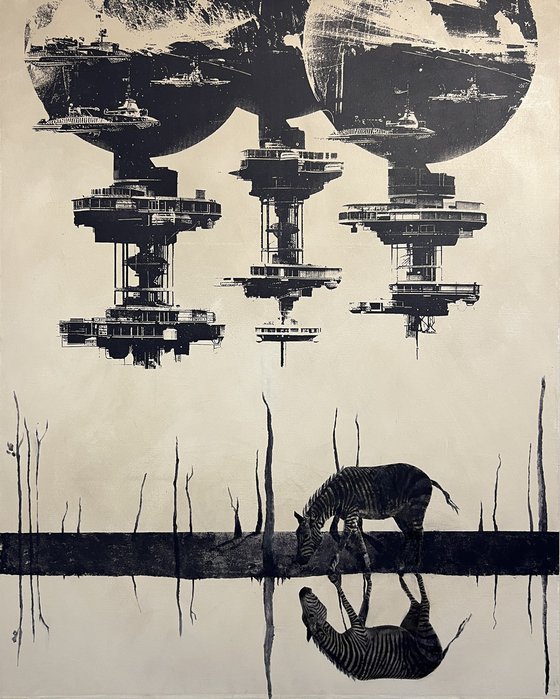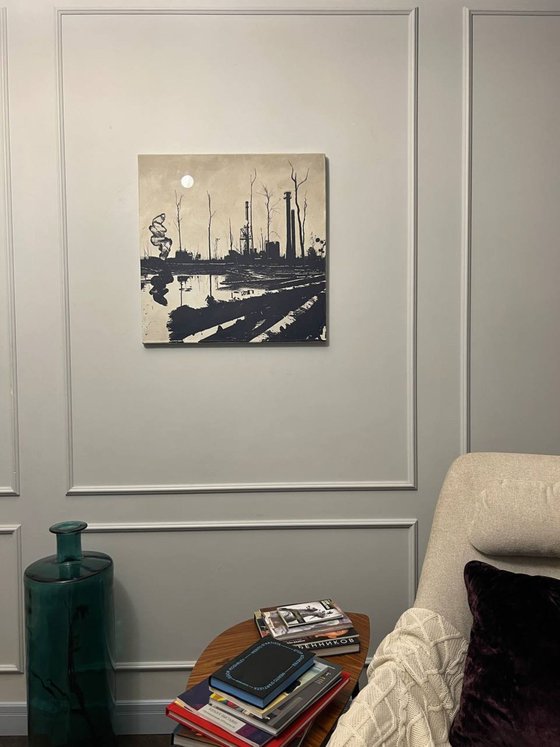- Nina Grigel
- All Artworks
- "Libertati"
Original artwork description
There is a curious version of why the development of Africa did not follow the path of the development of Eurasian civilizations.
Agriculture has given a rapid impetus to human civilization. It allowed us to accumulate an excess of food. This means that it has led to a settled lifestyle, population growth, the emergence of cities, etc.
In the ancient world, the weakness of human muscles was a limiting factor.
Horses revolutionized agriculture, transportation, and warfare to the point where civilizations (Eurasia) that had cattle and especially horses suppressed others.
Zebras are like horses. But they are aggressive, they have no hierarchy, which means that a person cannot become the leader of their group — these two important factors prevented a person in Africa from domesticating it to help in agriculture.
Zebra is a symbol of independence and freedom. And no progressors could agree with them or bend them to their will.
Progressivism Project – research series: The study of the topic of progressivism has worried me since my youth, since the time of the first books I read by the Strugatsky brothers, who presented this concept to the world.
According to Strugatsky, progressors are representatives of highly developed intelligent races whose duties include promoting the historical progress of civilizations at a lower level of social development, and to put it another way, progressors are those people/humanoids who impose their worldview on weaker civilizations. These can be gifts in the form of new knowledge, new technologies, as well as the endowment of wards with superpowers at the genetic level; in this case, most likely, the wards of civilizations lose their identity, special features.
Is this really necessary for more backward civilizations? Don't they need to go their own way in a timely manner, do they need worlds created like carbon copies, even if they are reasonable, high-tech and humane?
If we look at this theory through the prism of world history and correlate it with various events taking place in different time periods on our planet, then the influence of the "progressors" constantly and persistently runs through them. For example, the imposition of their “world order” by more developed countries - third world countries under the motto: “Happiness for everyone, and let no one leave offended.”
In this project, I suggest the viewer to speculate whether we/they need progressors? Is outside influence always justified? I'm not giving answers, I'm offering questions for discussion, I'm opening a portal to a problem that goes hand in hand with an interdisciplinary approach to understanding this topic.
Selected Exhibitions:
2025 SberUniversity, Moscow, Russia
2024 “A Word About the Russian Heart” Festival, Beijing, China
2024 ArtExpo New York 2024, New York, USA
2024 La Pigna Gallery, Rome, Italy
2024 ArtPlay Moscow, Kvartiras Gallery, Moscow, Russia
2024 Pavlodar City Museum, Kazakhstan
2023 Shanghai International Art Fair (SIAF), Shanghai, China
2023 «Zdes na Taganke» Gallery, Moscow, Russia
2022 ArtDom, Winzavod, Moscow, Russia
2021 Kibart, Moscow, Russia
2021 International Exhibition Competition Of Futuristic Art, Moscow, Russia
2021 Artplay, Moscow, Russia
2021 Finalist, Russian Art Awards, Moscow House Of Artists, Moscow, Russia
2021 International Exhibition “SCOLKOVO Plaza ArtShow”, Moscow, Russia
2021 Art Cosmos, Evraziya Gallery, Moscow, Russia
2021 Online Exhibition & Competition «Sbornaya Solianka», Alipova Gallery, Moscow, Russia
Collections:
2023 Lucy Chebotina Charity Auction, Private Collection, Moscow, Russia
Publications:
Art MUSE Magazine, "Art Survey" column, Russia
Details:
- Acrylic painting on Canvas
- One of a kind artwork
- Size: 80 x 100cm (unframed)
- Ready to hang
- Signed on the front
- Style: Surrealistic
- Subject: Animals and birds
Tags:
#water#animals#zebra#fantasy#worlds#parallel worlds14 day money back guaranteeLearn more
Original artwork description
There is a curious version of why the development of Africa did not follow the path of the development of Eurasian civilizations.
Agriculture has given a rapid impetus to human civilization. It allowed us to accumulate an excess of food. This means that it has led to a settled lifestyle, population growth, the emergence of cities, etc.
In the ancient world, the weakness of human muscles was a limiting factor.
Horses revolutionized agriculture, transportation, and warfare to the point where civilizations (Eurasia) that had cattle and especially horses suppressed others.
Zebras are like horses. But they are aggressive, they have no hierarchy, which means that a person cannot become the leader of their group — these two important factors prevented a person in Africa from domesticating it to help in agriculture.
Zebra is a symbol of independence and freedom. And no progressors could agree with them or bend them to their will.
Progressivism Project – research series: The study of the topic of progressivism has worried me since my youth, since the time of the first books I read by the Strugatsky brothers, who presented this concept to the world.
According to Strugatsky, progressors are representatives of highly developed intelligent races whose duties include promoting the historical progress of civilizations at a lower level of social development, and to put it another way, progressors are those people/humanoids who impose their worldview on weaker civilizations. These can be gifts in the form of new knowledge, new technologies, as well as the endowment of wards with superpowers at the genetic level; in this case, most likely, the wards of civilizations lose their identity, special features.
Is this really necessary for more backward civilizations? Don't they need to go their own way in a timely manner, do they need worlds created like carbon copies, even if they are reasonable, high-tech and humane?
If we look at this theory through the prism of world history and correlate it with various events taking place in different time periods on our planet, then the influence of the "progressors" constantly and persistently runs through them. For example, the imposition of their “world order” by more developed countries - third world countries under the motto: “Happiness for everyone, and let no one leave offended.”
In this project, I suggest the viewer to speculate whether we/they need progressors? Is outside influence always justified? I'm not giving answers, I'm offering questions for discussion, I'm opening a portal to a problem that goes hand in hand with an interdisciplinary approach to understanding this topic.
Selected Exhibitions:
2025 SberUniversity, Moscow, Russia
2024 “A Word About the Russian Heart” Festival, Beijing, China
2024 ArtExpo New York 2024, New York, USA
2024 La Pigna Gallery, Rome, Italy
2024 ArtPlay Moscow, Kvartiras Gallery, Moscow, Russia
2024 Pavlodar City Museum, Kazakhstan
2023 Shanghai International Art Fair (SIAF), Shanghai, China
2023 «Zdes na Taganke» Gallery, Moscow, Russia
2022 ArtDom, Winzavod, Moscow, Russia
2021 Kibart, Moscow, Russia
2021 International Exhibition Competition Of Futuristic Art, Moscow, Russia
2021 Artplay, Moscow, Russia
2021 Finalist, Russian Art Awards, Moscow House Of Artists, Moscow, Russia
2021 International Exhibition “SCOLKOVO Plaza ArtShow”, Moscow, Russia
2021 Art Cosmos, Evraziya Gallery, Moscow, Russia
2021 Online Exhibition & Competition «Sbornaya Solianka», Alipova Gallery, Moscow, Russia
Collections:
2023 Lucy Chebotina Charity Auction, Private Collection, Moscow, Russia
Publications:
Art MUSE Magazine, "Art Survey" column, Russia
Details:
- Acrylic painting on Canvas
- One of a kind artwork
- Size: 80 x 100cm (unframed)
- Ready to hang
- Signed on the front
- Style: Surrealistic
- Subject: Animals and birds
Tags:
#water#animals#zebra#fantasy#worlds#parallel worlds



